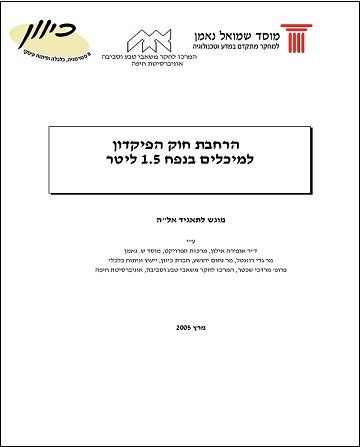This joint research project, carried out by the Samuel Neaman Institute and ELA- the recycling cooperative, examined the following parameters:
- Economic costs of the Packaging Law in Israel
- Implications of expanding the Deposit Law to 1.5 liter bottles
Results of the studies indicate that the bottle deposit law in its present form, taking into account the overall costs – internal and external benefits, is more costly than beneficial. In fact, the bottle deposit law imposes excessive costs on the economy, while the environmental benefits it yields are very low. Yet, at a cost that is lower than that of the bottle deposit law, it is possible to institute a solid waste policy that will lead to recycling on a much broader scale, with more efficient utilization of resources. This can be achieved by implementing a packaging law, similar to those which are operating successfully in many European countries, which are leading the world in waste management











